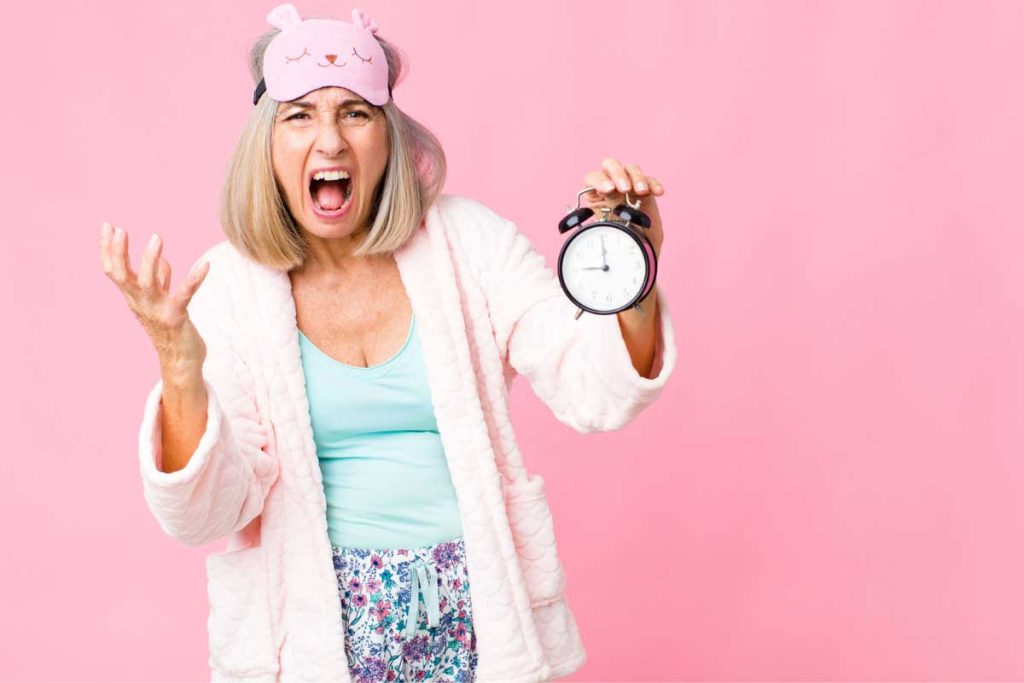“Who needs sleep?
Well you’re never gonna get it.
Who needs sleep?
Tell me what’s that for.
Who needs sleep?”
Are those popular lyrics from The Barenaked Ladies on repeat night after night? For menopausal women, sleep can be elusive. Understanding why you can’t sleep can help you naturally find ways to get more shut-eye, so you don’t have to be happy with what you’re getting, as the lyrics indicate.
Does menopause cause sleep issues?
While the song lyrics talk about not needing sleep because “there’s a guy whose been awake since the Second World War,” they should reference a woman. Sleep disruptions often start long before you reach menopause.
If you have children, you most likely experienced sleeplessness during pregnancy and following the birth of a child.
Research also shows the natural rise and fall of hormones in a woman’s body during her menstrual cycle can disrupt sleep.
In a sleep study from the Study of Women’s Health Across the Nation (SWAN), researchers found sleep efficiency gradually (the percentage of time spent asleep while in bed) dipped throughout the month in a small group of late reproductive-aged women. It was lowest when a woman was premenstrual. Women slept 25 minutes less in the fourth week of their cycle compared to the third week.
Did you ever notice that connection with your cycle?
Even if you’ve never experienced sleeplessness before, you’ll likely feel it during the dramatic shift in your hormones experienced during the menopause transition. Sleeplessness is a common menopause symptom.
A study in the Endocrine Society’s Journal of Clinical Endocrinology and Metabolism shows sleep disruption can start three to five years before menopause during the transition stage of perimenopause.
In addition to fluctuating hormones, symptoms like hot flashes and night sweats experienced during perimenopause also can lead to poor sleep. And cold flashes can contribute to sleeplessness as well.
Why can’t I sleep during perimenopause?
Even if you’ve escaped sleepless nights at other times in your life, good luck escaping them during perimenopause!
Consider the numbers:
- Around 12% of women generally complain of sleep issues, according to the Sleep Foundation.
- That number climbs to 40% of women by the time they reach their late 40s and early 50s.
- By post-menopause the number of women who experience sleep problems can climb up to 60%.
Those numbers increase for several reasons.
- As you age, your natural sleep-wake cycle changes and loses consistency. You may feel tired earlier, go to bed earlier at night, and wake up earlier in the morning.
- Stress may be another factor. During mid-life, women may be caring for aging parents, worrying about aging themselves or have anxiety about an empty nest. All of these life events and concerns can disrupt sleep. Try these self-care strategies to de-stress.
- Plus, you’re more likely to take medication later in life, and certain medications can disrupt sleep.
- Some early studies indicate environmental factors can impact sleep too.
- The food you eat and the liquids you consume can also increase perimenopause symptoms and cause you to lie awake at night.
- General joint pains and body aches often arise during perimenopause along with other potential issues like reduced muscle mass and strength and osteopenia/osteoporosis, which are known as musculoskeletal syndrome of menopause (MSM).
- Bladder problems related to genitourinary syndrome of menopause (GSM) are common during the post-menopause stage of the journey and can disrupt sleep.
- Women+ are also at greater risk of restless leg syndrome (RLS) during the hormonal transition, which can make getting enough good-quality sleep challenging. They may also experience other types of leg pain, like greater trochanteric syndrome, which is more common in women+ between the ages of 40-60.
- Finally, the symptoms most commonly associated with perimenopause, night sweats and hot flashes, can cause you to wake.
Additionally, studies have shown a history of infertility increases the likelihood of sleep issues during midlife (as well as depression and irritability) and more severe symptoms during the menopause journey as measured by the Menopause Rating Scale.
Other studies also indicate experiencing more severe vaginal dryness and decreased libido, particularly if you are a white woman+.
During the menopause journey, levels of the stress hormone cortisol can increase. In turn, higher cortisol levels, particularly at the wrong points during your 24-hour circadian rhythm, can result in sleep issues like reduced sleep duration and deep sleep. waking up in the middle of the night, and insomnia.
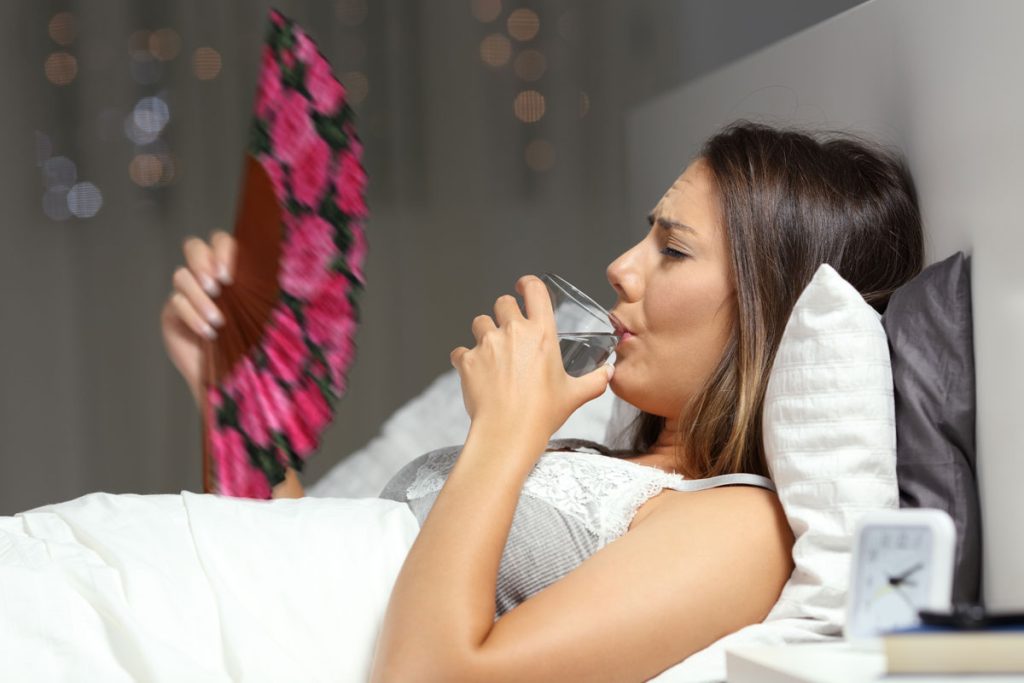
Hot flashes and lack of sleep
If anything is going to jolt you awake at night during menopause, it’s likely going to be a hot flash, cold flash, or night sweats!
In the SWAN study, women with moderate-to-severe hot flashes (defined as hot flashes 6-14 days over 2 weeks) were almost three times more likely to report frequent nighttime awakenings than women who did not experience them.
With up to 80 percent of women reporting hot flashes, you can understand why perimenopausal women have trouble sleeping.
The sudden rush of heat, sweat, anxiety, and chills can last three to ten minutes, and they can happen at all hours of the day and night.
Yet, in the pausitive health menopause study, several women said they didn’t understand the relationship between hot flashes and sleep disruption.
While not all hot flashes will wake you, there appears to be a connection between hot flashes and lack of sleep.
Have you ever woken up minutes before a hot flash, as if your body knows it’s coming?
These awakenings happen because changes in the brain lead to hot flashes, according to an assistant professor of medicine at the Johns Hopkins Sleep Disorders Center.
So, it’s not just the heat from the flash. It’s the changes in your brain that can wake you up.
The SWAN study found the median length of time women experienced hot flashes was 7.4 years, but they lasted up to 14 years for some women!
Fourteen years is a long time to go without adequate sleep!
Hot flashes and your brain
If you experience hot flashes that wake you up at night, you may be able to thank the power of beta waves in your brain.
Never heard of them? Let’s catch you up so you know their potential relationship to your hot flashes.
Your brain is always abuzz with electrical pulses throughout the day. The waves of activity vary based on what you’re thinking or doing at the time.
There are five different types of waves – gamma, beta, alpha, theta, and delta brain waves. They range from slow to fast. Beta waves are those that are dominant when you are conscious and alert.
Have you seen the photos of a person hooked up to a bunch of electrodes during a sleep study? That’s an electroencephalogram test (EEG). It measures the electrical activity that fires in your brain.
One analysis found beta wave electrical activity increases in late perimenopausal and post-menopausal women.
Your brain produces beta waves at night, which are more commonly associated with daytime activity. So, it’s no wonder you can’t sleep!
Researchers believe treating the arousal level can improve sleep. Relaxation methods are one way to calm those beta waves and induce slower waves leading up to and during sleep.
Environmental causes of sleep problems
While hot flashes and hormones get a lot of the attention, and for good reason, since so many women suffer, they’re not the only cause of sleep disruptions.
Researchers believe environmental factors like phthalates may also contribute to poor sleep in perimenopause. An analysis of the Midlife Women’s Health Study, published in Menopause, a journal of The Menopause Society, found a significant association between phthalate exposure and sleep disruption.
Phthalates make plastics more durable. They’re in everyday products, including personal care items like shampoo, eye shadow, perfume, moisturizer, nail polish, liquid soap, and hair spray.
In general, Black and Hispanic women have greater exposure to phthalates, and women are more likely to have higher levels of the metabolites of phthalates than men.
Phthalates also have endocrine-disrupting capabilities. That means they can change hormone levels.
While researchers are just beginning to understand the connection between phthalate exposure and sleep quality, early indicators show a link.
Impacts of sleep deprivation
We all know how great it feels to get a really good night’s sleep. We are also well aware of how a few days of missed hours can add up quickly and lead to fatigue, cloudy thinking, reduced reflexes, irritability, and even falling asleep at the wheel of vehicle or while operating machinery.
To add to those many negative impacts, experiencing an insufficient number of hours of good-quality sleep can also contribute to other problems, like weight gain and cognitive decline.
Insufficient sleep and sleep disruption can negatively impact two hormones that control appetite and food intake – leptin and ghrelin.
- Leptin helps you to manage your weight by regulating hunger and providing a sensation of satiety (feeling full).
- Ghrelin signals when your stomach is full and triggers the hunger to eat.
When you have sleep issues, your leptin levels fall, and ghrelin levels increase, leading to increased food intake and food cravings, which can lead to weight gain.
Studies have suggested that having issues with sleep fragmentation in your 30s and 40s can result in poorer cognitive performance in midlife.
Issues with sleep also increase the risk of chronic conditions like cardiovascular disease, type 2 diabetes, obesity, and depression.
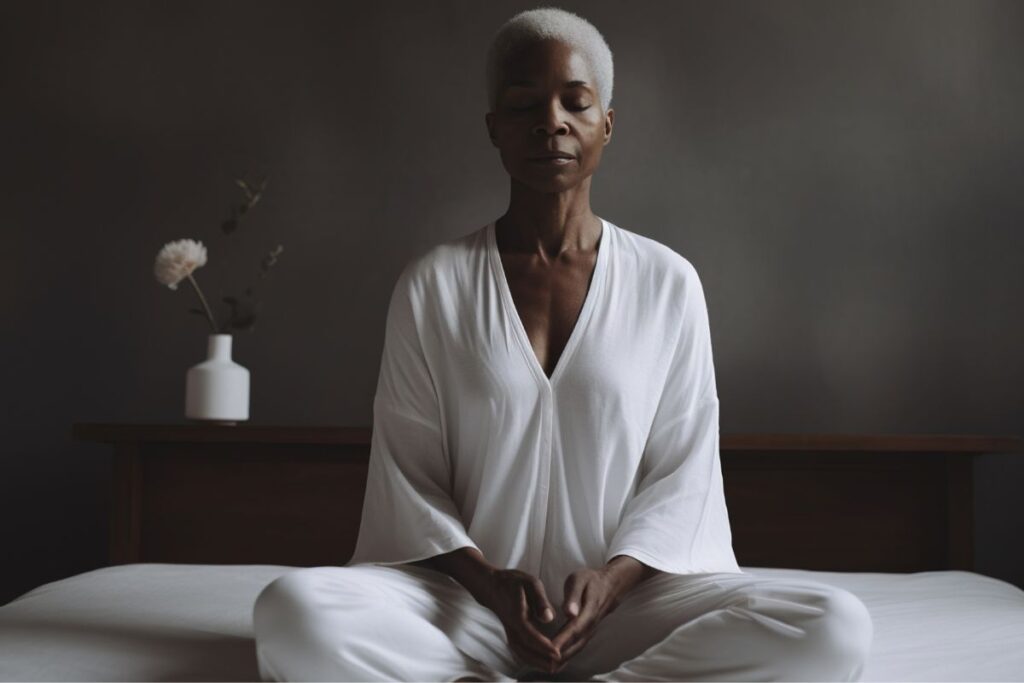
Ways to get better sleep
Understanding why you can’t sleep can help you identify the best way to encourage your body to sleep and put you on the path to better health.
1. Establish a “sleep hygiene” routine
Whether it’s hot flashes, stress, anxiety, incontinence, or body aches – find ways to manage these sleep inhibitors. You can do this with a sleep hygiene routine during the day and at night. Here are some ways to get started:
Exercise or go for a walk outside during the day.
Research shows walking outside can help sleep. Complete exercise several hours before bed.
Focus on what you eat and drink.
Minimize alcoholic drinks and avoid large meals about 4 hours before bed.
Set the stage for a good night’s sleep.
Create a better sleep environment. Think cool, dark, and quiet. Only use your bedroom for sex and sleep.
Try a relaxation technique.
This may be yoga, brain-wave activity, deep breathing or other sleep-inducing mind-body techniques.
Take steps to reduce perimenopause symptoms like hot flashes.
You can watch what you eat, avoiding foods that can cause hot flashes.
2. Get control of stress
This time of transition is a perfect opportunity to explore new things and ways of being. Many of the techniques used to help you get a good night’s sleep have the added benefit of helping to improve your overall health, reduce menopausal symptoms, and enhance your well-being both now and in the vibrant years that lie ahead of you.
During the menopause journey, stress can increase due to increased levels of the stress hormone cortisol. In addition to the day-to-day stressors of life, you may also experience added pressure from the disruptions that menopausal symptoms can bring. Stress can be a major contributory factor to sleep issues – difficulties with falling asleep, waking up during the night, early awakening, and insufficient time spent in deep sleep.
Although some degree of stress can be a positive motivator or warning of danger ahead, levels that are high and become chronic can be very damaging to your physical and mental health, as well as increase menopausal symptoms.
You can’t achieve a completely stress-free life, but you can gain control to your reaction to people and situations which trigger you and lead to unhealthy coping behaviors.
pausitive health has your back!
- As always, knowledge is power and helps to bring understanding and insights you can leverage. Learn about stress and how it impacts your health, well-being, and menopausal symptoms.
- Then, use this guide to find ways to manage stress in the moment and reduce levels to a healthy level for the long-term.
- You can also download the Be Less Stressed Toolkit.
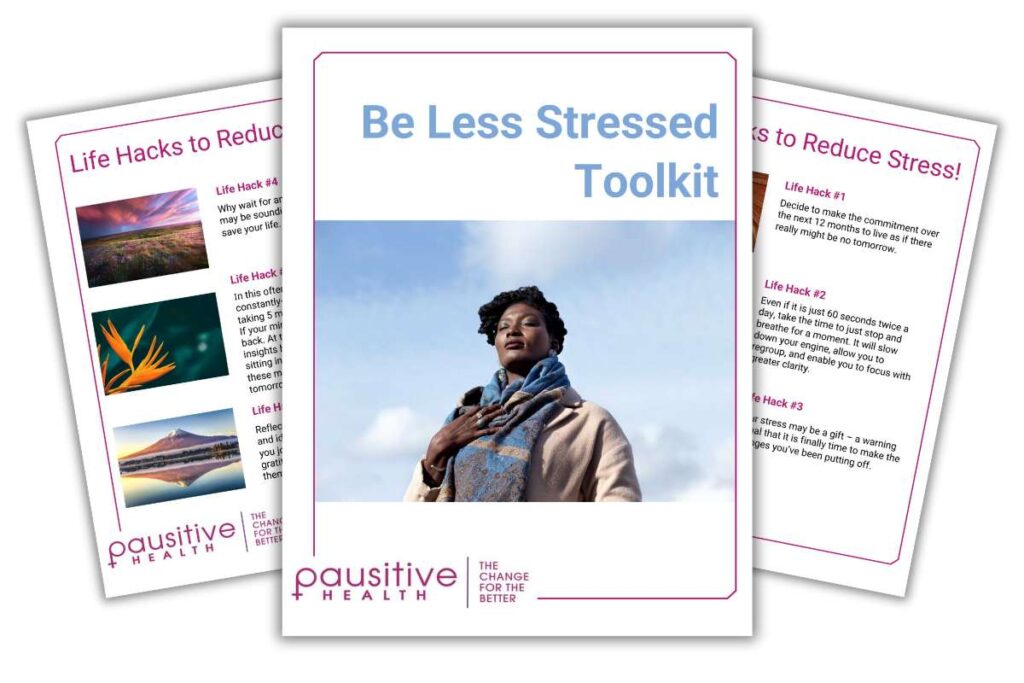
Be Less Stressed
Feeling stressed or overwhelmed? Learn life hacks to reduce stress with the Be Less Stressed toolkit.
"*" indicates required fields
Time to get enough good-quality sleep!
You don’t have to feel like you’re just in survival mode during the menopause journey. Think of this as a time to empower yourself with the knowledge to optimize your health and well-being and set the stage for the years ahead on the other side of menopause. You can reduce the symptoms experienced during the menopause journey. Understanding why you feel the way you do can help you regain control and get more sleep.
The menopause transition is a time of discovery and sometimes you just need affirmation and confidence that comes from knowing you can do something.
That way you can re-write those song lyrics to:
Who needs sleep?
I do, and I’m gonna get it!
Zheng H, Harlow SD, Kravitz HM, Bromberger J, Buysse DJ, Matthews KA, Gold EB, Owens JF, Hall M. Actigraphy-defined measures of sleep and movement across the menstrual cycle in midlife menstruating women: Study of Women’s Health Across the Nation Sleep Study. Menopause. 2015 Jan;22(1):66-74. doi: 10.1097/GME.0000000000000249. PMID: 24845393; PMCID: PMC4237700.
Hatcher, Katherine M. MS1; Smith, Rebecca L. DVM, PhD2; Chiang, Catheryne PhD3; Li, Zhong PhD4; Flaws, Jodi A. PhD3; Mahoney, Megan M. PhD1,3. Association of phthalate exposure and endogenous hormones with self-reported sleep disruptions: results from the Midlife Women’s Health Study. Menopause 27(11):p 1251-1264, November 2020. | DOI: 10.1097/GME.0000000000001614
Welch BM, Keil AP, Buckley JP, Engel SM, James-Todd T, Zota AR, Alshawabkeh AN, Barrett ES, Bloom MS, Bush NR, Cordero JF, Dabelea D, Eskenazi B, Lanphear BP, Padmanabhan V, Sathyanarayana S, Swan SH, Aalborg J, Baird DD, Binder AM, Bradman A, Braun JM, Calafat AM, Cantonwine DE, Christenbury KE, Factor-Litvak P, Harley KG, Hauser R, Herbstman JB, Hertz-Picciotto I, Holland N, Jukic AMZ, McElrath TF, Meeker JD, Messerlian C, Michels KB, Newman RB, Nguyen RHN, O’Brien KM, Rauh VA, Redmon B, Rich DQ, Rosen EM, Schmidt RJ, Sparks AE, Starling AP, Wang C, Watkins DJ, Weinberg CR, Weinberger B, Wenzel AG, Wilcox AJ, Yolton K, Zhang Y, Ferguson KK. Racial and Ethnic Disparities in Phthalate Exposure and Preterm Birth: A Pooled Study of Sixteen U.S. Cohorts. Environ Health Perspect. 2023 Dec;131(12):127015. doi: 10.1289/EHP12831. Epub 2023 Dec 20. PMID: 38117586; PMCID: PMC10732302.
Leng Y, Knutsen K, Carnethon MR, and Yaffe K. Association Between Sleep Quantity and Quality in Early Adulthood With Cognitive Function in Midlife. Neurology. Issue 102 (2) January 23, 2024. https://doi.org/10.1212/WNL.0000000000208056
Sullivan Bisson AN, Robinson SA, Lachman ME. Walk to a better night of sleep: testing the relationship between physical activity and sleep. Sleep Health. 2019 Oct;5(5):487-494. doi: 10.1016/j.sleh.2019.06.003. Epub 2019 Jul 26. PMID: 31358470; PMCID: PMC6801055.
You may also like…
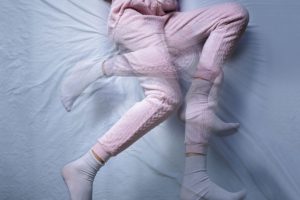
Why Women+ Are Prone To Restless Leg Syndrome (RLS) And How To Treat It
Do your legs move uncontrollably at night? Learn why Restless Leg Syndrome (RLS), is more common in women and how to treat it.
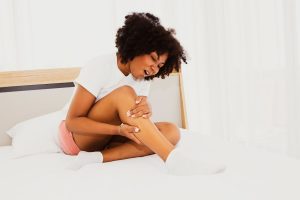
Having Leg Pain And Cramps? You May Be In Menopause
Do you have leg pain and cramps, during the day or at night? It’s a menopause symptom. Learn how to treat the leg pain.
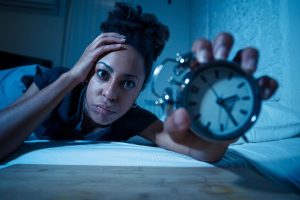
The Sleep Hygiene Hack That “Tunes” Your Brain For Better Quality Sleep
Ready to “tune” your brain for better sleep? Add binaural beats to your sleep hygiene routine to improve sleeplessness during menopause.

